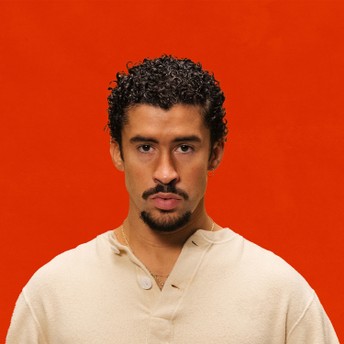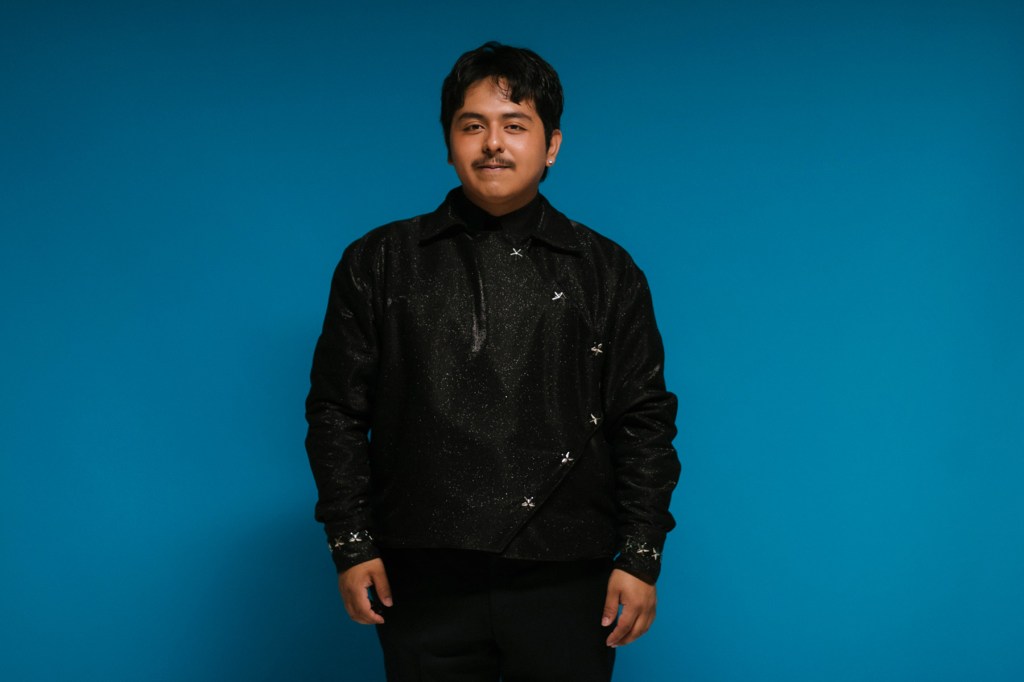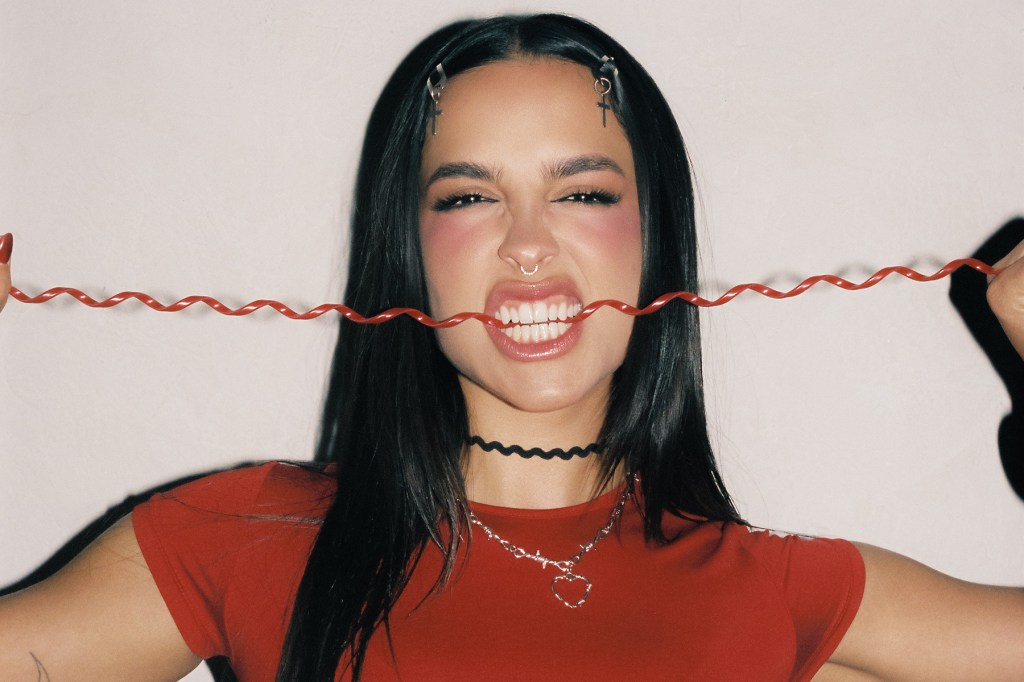Latin
Page: 8
Trending on Billboard
Hija De Tu Madre fashion designer Patty Delgado and Walmart teamed up on the exclusive Nueva Vida collection, and Latin pop star Corina Smith helped bring the line to life during Billboard Latin Music Week.
Explore
Corina Smith
See latest videos, charts and news
During Smith’s preparation for her En Vivo performance at Club M2 Miami, Billboard was on-site with the Venezuelan star in the hours leading up to her set, as she sifted through the Latina-founded apparel collection to select wardrobe pieces for herself and her backup dancers. The 14-piece unisex collab includes everything from jackets to matching pants and vests, serving as a tribute to Patty’s first-generation identity and her parents’ journey from Mexico.
Related
Stefon Diggs Reveals Sex of Baby With Cardi B, Teases Birth Will Be ‘Real Soon’
Katy Perry Teases ‘Bandaid’ Single With Bruised & Battered Image
A$AP Rocky Is Loving Life as a Girl Dad: ‘Check Me Out — I’m Glowing’
“As soon as I saw the collection, there were so many things that I immediately thought I could wear onstage, but also offstage,” the star told Billboard of the line. “I’m also glad people who see our performance can shop these pieces at Walmart.”
Scroll below to see more of Smith and Nueva Vida by Hija De Tu Madre collection, available exclusively at Walmart.
Nick Vega for Billboard
Nick Vega for Billboard
Nick Vega for Billboard
Nick Vega for Billboard
Nick Vega for Billboard
Nick Vega for Billboard
Nick Vega for Billboard
Nick Vega for Billboard
Nick Vega for Billboard
Nick Vega for Billboard
Nick Vega for Billboard
Nick Vega for Billboard
[embedded content]
Trending on Billboard
Bad Bunny, Karol G, CA7RIEL & Paco Amoroso, Fuerza Regida, Marco Antonio Solís, and Chuwi have been added to the 2025 Latin Grammy Awards lineup, The Latin Recording Academy announced on Tuesday (Nov. 4).
Explore
See latest videos, charts and news
The new wave of performers join previously confirmed artists Pepe Aguilar, Aitana, Rauw Alejandro, Edgar Barrera, Ivan Cornejo, DannyLux, Gloria Estefan, Joaquina, Kakalo, Carín León, Liniker, Morat, Christian Nodal, Los Tigres del Norte, Nathy Peluso, Elena Rose, Alejandro Sanz, Grupo Frontera, Kacey Musgraves, Carlos Santana and the 2025 Person of the Year, Raphael.
Bad Bunny leads this year’s nominations, receiving 12 nods including for album of the year with Debí Tirar Más Fotos and double mentions in record of the year and song of the year, with “Baile Inolvidable” and “DTMF.” The Puerto Rican artist is closely followed by Mexican hitmaker Edgar Barrera and Argentine duo CA7RIEL & Paco Amoroso, each with 10 nominations.
In addition to Raphael being honored as the 2025 Person of the Year, The Latin Recording Academy’s special awards recipients this year include Afro-Peruvian artist Susana Baca, Spanish rock icon Enrique Bunbury, Brazilian musician Ivan Lins and Mexican vocal trio Pandora. Meanwhile, Puerto Rican tropical star Olga Tañón will be honored with the Lifetime Achievement Award and Eric Schilling with the Trustees Award.
The 26th Annual Latin Grammy Awards will be broadcast live at 8 p.m. ET/PT on Nov. 13 from Las Vegas via TelevisaUnivision platforms. Prior to the live broadcast, the Latin Grammy Premiere, a non-televised event where the majority of winners are announced, will take place.
Trending on Billboard Marc Anthony announced Tuesday (Nov. 4) his first-ever residency in Las Vegas. The 10-date “Vegas… My Way!” will take place at BleauLive Theater at the Fontainebleau, kicking off Feb. 13. “This residency marks a new chapter in my journey,” Marc Anthony said in a statement. “Las Vegas has always been about reinvention […]
Trending on Billboard
Shakira received the inaugural Billboard Global Touring Icon Award in honor of her historic Las Mujeres Ya No Lloran World Tour, and as part of the 2025 Billboard Live Music Summit held Monday (Nov. 3) in West Hollywood, California.
“As your longtime tour manager, I am so proud and truly honored to present the first annual Billboard global icon tour award to you,” said tour director Marty Hom, who’s also worked for Fleetwood Mac, Barbra Streisand and The Rolling Stones, among others. “We get to witness every day how hard you work to do the best show possible for all your fans.”
Shakira, who received the news backstage during the rehearsals of her recent show in Cali, Colombia, dedicated the award to her entire team, including dancers, band and crew, for “working as hard as I do,” she noted.
The Live Nation-produced tour’s first 64 dates (of 82) grossed $327.4 million and sold 2.5 million tickets, according to Billboard Boxscore, converting Las Mujeres Ya No Lloran into the highest grossing Latin tour ever by a woman and the second highest grossing Latin tour ever (behind only Luis Miguel’s 2023-24 outing, which grossed $409.5 million).
Additionally, the Colombian artist sold 65,000 tickets per night during her historic 12-concert run at Mexico City’s Estadio GNP Seguros (formerly known as Foro Sol), according to promoter OCESA, for a total of 780,000 tickets sold.
“It’s encouraging and inspiring,” Shakira said to Hom. “I never thought, not even in my wildest dreams, that I would fill every stadium. It’s incredible and motivating at the same time, I feel like I’m just starting my career, and it’s crazy because it’s been 30 years … This has been the best tour of my life, it’s been just as we dreamt it. We worked so hard, overcoming every obstacle, it hasn’t been easy, we worked many, many long hours to make everything as good as people deserve it.”
Backstage at her show in Cali — where she performed for the first time in 20 years — Shakira also discussed her personal life: “I’m completely dedicated to my boys and my career. That’s all I need, my boys, my fans and my music, and creating, it’s fulfilling a big part of my life right now.”
Trending on Billboard
Rauw Alejandro took a day off between stops on his Cosa Nuestra tour to attend the 2025 Billboard Live Music Summit in Los Angeles to explain how a new partnership with Live Nation helped him create a theatrical spectacle that could “travel through the whole world.”
Alejandro — who came straight from a Sunday (Nov. 2) show in Monterrey, Mexico and has to fly right back for a Tuesday (Nov. 4) performance in Mexico City — took the stage for a spotlight conversation with Billboard’s Leila Cobo and Live Nation senior vp of global touring Hans Schafer at the 1 Hotel West Hollywood on Monday (Nov. 3).
Related
The Cosa Nuestra tour is a high-concept, 1970s New York-inspired spectacle supporting Alejandro’s 2024 album of the same name, which hit No. 6 on the Billboard 200. The tour grossed $91.7 million across spring and summer legs in North America and Europe before heading to South America and Mexico. Alejandro will conclude at the end of this month with a five-date residency at San Juan’s Coliseo de Puerto Rico José Miguel Agrelot.
During the discussion, the cover star of Billboard’s touring issue explained that after attending live theater in New York, he was inspired to create what he called “the biggest Broadway show on earth” — though it’s not so easy to bring Broadway to an arena. Enter Live Nation.
“I consider myself the best, so I want to work with the best team,” said Alejandro of joining up with the concert giant for the tour.
As Alejandro explained, Live Nation helped him bring his vision to life using maximum precision. “We could sell stadiums,” said Alejandro, but ultimately, he and his team decided to schedule his tour in arenas to “focus on the art.” The tour also eschewed outdoor venues, preferring the dark environment of an indoor arena to better evoke the feel of a Broadway theater.
Related
A huge priority, said Alejandro, was to create consistency across markets. As he put it, he didn’t want South American fans to watch one version of Cosa Nuestra on TikTok during the U.S. leg and then be disappointed when a different show came to their cities.
“I had to find a show that I can take everywhere, because I think my fans deserve the best of me,” said Alejandro. “For me, it was really important to put our minds together and find this perfect show that I can travel through the whole world, and I think we did it.”
Schafer, who runs Latin touring for Live Nation, said he was galvanized by Alejandro’s desire to prioritize performance quality over all else.
“The greatest is when you partner with an artist team and they are not looking to make it the biggest, they are looking to make it matter,” said Schafer.
Monday’s panel also covered the way Alejandro was inspired by salsa music for Cosa Nuestra and how he stays in shape for the demanding, dance-heavy show. He said he eats clean — “salmon, white rice, vegetables” — works out and doesn’t drink or smoke on show days.
Alejandro also hinted at what’s next for his touring career. The reggaeton star said he does intend to play stadiums — and that in the future, he aims to take his shows to even more markets than he did this time around. “We want to conquer Asia,” he said.
Trending on Billboard 2025 will be a year marked by a moment that went viral on the internet: that of a musician who swept the streets in the early mornings in Mexico City and who, with a video on TikTok, managed to connect with millions through an uplifting song, “Sueña Lindo,” and his personal story. […]

Trending on Billboard
Carlos Rivera chose the Day of the Dead celebration to launch VIDA, a six-song EP filled with nostalgia, delving into mariachi, sierreño and even tumbado music. The Mexican pop star, born in Huamantla, a small town in the state of Tlaxcala, recently presented this material there, proudly showcasing his roots.
Explore
See latest videos, charts and news
“I want the world to know more about my country’s traditions,” Rivera tells Billboard Español. “We Mexicans celebrate the lives of those who have passed away in a very unique way, with flavors, colors, and music.”
“Mexico is mariachi, Día de Muertos,” adds the singer of “Recuérdame,” a song that was part of the Disney-Pixar animated film Coco (2017), famous for celebrating the way Mexicans deal with the subject of death. “I always thought that if I was going to do a project like this, it had to be looking at life from a different angle. This EP is inspired by loss and grief.”
Released by Sony Music Mexico on Oct. 30, VIDA opens with “Larga Vida,” a song about enjoying every moment with our loved ones. It includes a collaboration with Ana Bárbara accompanied by traditional mariachi, “Cuento de Nunca Acabar,” about trying to forget someone without success. And songs like “Calavera,” a huapango about denying death, and “Alguien,” which talks about being used to replace someone.
The singer says that after his father passed away three years ago, he began composing and searching for songs as a form of catharsis to ease the pain a little and help others who have been through the same situation.
“There are a couple of songs I wrote for my dad when he died,” he says. “One of them is ‘No Es Para Menos,’ in which I talk about the pain coming all at once so that whatever needs to hurt hurts and the suffering ends. In ‘Almas,’ the guitars practically cry from the beginning; the lyrics are about the absence of a person when they leave and places like an armchair are left empty.”
With “Larga Vida,” the focus track, “rather than honoring those who died, I wanted to talk about the importance of enjoying those who are alive and whom we never want to see leave,” Rivera explains. “Originally it was with guitar, which was very beautiful, but I thought we could put more energy into the requinto. So it sounded very sierreño and even tumbado, but using mariachi instruments.”
Regarding the only collaboration on the EP — “Cuento de Nunca Acabar,” with regional Mexican star Ana Bárbara — he says: “From the very beginning, I thought of her to sing it together. Her style of practically crying the songs fit perfectly.”
After participating in the soundtrack for Coco, Rivera had sporadically experimented with regional Mexican music. He did so with mariachi on that occasion and in “100 años” with Maluma. Later, in 2023, he invited Carín León and Edén Muñoz to accompany him on “Alguien Me Espera en Madrid,” and in early 2025, he released “Tu Amor Es Mío” with Fato and Alfredo Olivas.
“I love the genre. It’s my roots, and I want to take it everywhere,” says Rivera. “Fortunately, my music is heard in many places in Latin America and Europe, so I want to take the whole concept of VIDA on my next tour.”
He revealed that he is putting together a band of musicians that will include mariachi, and that he will also perform in palenques. The two-year tour will begin in 2026, during which the artist with two decades of experience will bring his fans hits such as “Que Lo Nuestro Se Quede Nuestro,” “Te Esperaba,” and “Me Muero.” The dates will be announced in the coming weeks.
Trending on Billboard
From career milestones to new music releases to major announcements and those little important moments, Billboard editors highlight uplifting moments in Latin music. Here’s what happened in the Latin music world this week.
Explore
See latest videos, charts and news
Kali Uchis to Receive Special Honor
Kali Uchis has been named a 2025 ASCAP Women Behind the Music, alongside honorees Kehlani and KPop Demon Hunters’ lead vocalist EJAE. “Every year, ASCAP looks forward to spotlighting some of music’s most extraordinary women by honoring them for their achievements at our Women Behind the Music event,” said Nicole George-Middleton, ASCAP Executive Vice President & Head of Creative Membership, in a statement. “This year we are thrilled to recognize three women who are pushing boundaries and capturing the world’s attention across different genres. Their creative success has propelled them to the top of the charts and is set to inspire the next generation of women in music.”
The Colombian artist will receive her award at the 17th annual ASCAP Women Behind the Music event, taking place Wednesday, Nov. 12 in Los Angeles, just weeks after her Superstar Q&A at the 2025 Billboard Latin Music Week in Miami earlier this month.
Lele Pons & Guaynaa in the Halloween Spirit
Lele Pons and Guaynaa are celebrating their first Halloween together as parents. Just days before the spooky holiday on Oct. 31, the Venezuelan social media star and Puerto Rican artist shared a photo of their adorable costume alongside their baby girl. In the cute carousel, the family of three is seen dressed up as Peter Pan (Guaynaa), Wendy Darling (Lele) and Tinkerbell (their daughter) — in costumes designed by Karina Garcia, according to the Instagram post.
Juan Luis Guerra is Celebrated Back Home
This week, Juan Luis Guerra was named “Patrimonio Musical y Poético de República Dominicana” (Musical and Poetic Heritage of the Dominican Republic) by Ministerio de Relaciones Exteriores (MIREX, Ministry of Foreign Affairs) in his native Dominican Republic.
“His career transcends the awards and distinctions he has accumulated,” said Minister Roberto Álvarez during the ceremony, according to a press release. “What is truly significant is his ability to narrate — with poetic verses that seduce and captivate the imagination and the heart — the everyday experiences of our people: their dreams of social justice, their deep faith, their joy, and their unwavering sense of humor.”
During the event, which coincides with the National Day of Merengue and National Day of Bachata, Guerra — behind timeless hits such as “Bachata Rosa,” “La Bilirrubina,” and “Mi Bendicion” — expressed the following: “I would like to conclude by giving glory and honor to the Lord Jesus. If there is one thing I am sure of, it is that my melodies, metaphors, and all my songs come from him.”
Latin Music Educator Award
The Latin Recording Academy, in partnership with the Latin GRAMMY Cultural Foundation, has announced its inaugural recipient of the Latin Music Educator Award. Honoring an “exceptional educator from the global music community who is making a significant impact by incorporating Latin music into their curriculum,” according to a statement, the first annual award was handed to Luciana Ortega of the Instituto Santa María de San Carlos, in Chile.
As part of the award, the school’s music program will receive a $10,000 instrument donation. Ortega — who has been teaching music for more than 10 years — will be honored during the 26th Annual Latin GRAMMY Week in Las Vegas. “We are proud to honor Luciana Ortega with the first Latin Music Educator Award,” said Manuel Abud, CEO of The Latin Recording Academy. “Her daily commitment to music students brings to life our mission to honor, celebrate, nurture and elevate Latin music and those that ensure its enduring legacy.”
Trending on Billboard
This week, Billboard’s New Music Latin roundup and playlist — curated by Billboard Latin and Billboard Español editors — features fresh new music, including fresh picks by DannyLux, a collaboration between Codiciado and Xavi and Rosalía’s highly awaited featuring with Björk and Yves Tumor, to name a few.
GALE unleashed her sophomore studio album Lo Que Puede Pasar, which explores heartbreak, new beginnings, and the nostalgia of first times in 13 tracks. On the set, the Puerto Rican artist is joined by collaborators Danny Ocean, LAGOS, and Abraham Mateo, to name a few, where she navigates with ease rhythms such as EDM, pop, and rock. “Beautifully produced from beginning to end, Lo Que Puede Pasar showcases an evolution in the sound of GALE, one of the most sought-after songwriters in Latin music, whose credits include hits for superstars like Shakira, Christina Aguilera, and Juanes,” Billboard Español’s Sigal Ratner-Arias said.
Speaking of new projects, Maria Becerra dropped “JOJO,” her first single from her forthcoming set called QUIMERA. Sonically, the track — co-produced and co-written by Becerra and XCROSS — is a hard-hitting dancehall fused with R&B elements, and lyrically, it’s about a girl named Jojo, who has a magnetic force and has no competition.
Other new releases this week include music from Maria Becerra, Banda El Recodo, and Majo Aguilar. In the latest New Music Latin poll, Esaú Ortiz’s Discontrol album won with more than 60% of the vote. Which release this week do you think is best? Give these new releases a spin and vote for your favorite new Latin music release below:
Editor’s Note: The results of the weekly New Music Latin poll will be posted if the poll generates more than 1,000 votes. This poll closes at 7:30 a.m. ET on Monday, Nov. 3.
Take Our Poll
Trending on Billboard
Spanish superstar Rosalía returned this week to Mexico City, where she attended a listening session for her new album LUX on Wednesday night (Oct. 29) with a lucky group of fans. Her visit turned into an entire culinary experience featuring popular Mexican dishes and a night of partying alongside her friends, the members of Mexican band Latin Mafia.
Rosalía shared the trip with her millions of followers on TikTok Live, showing her and her friends riding in a limousine through the streets of Mexico’s capital before arriving at a branch of a famous pozole restaurant chain. There, she tasted the popular dish for the first time — a broth made with corn kernels, chicken or pork, chili and topped with lettuce. She also enjoyed some enfrijoladas, tortillas dipped in bean sauce and filled with shredded chicken.
“First time eating pozole, guys,” Rosalía says in a video that has gone viral in Mexico since Thursday. “It’s tricky — it’s spicy,” she adds, pulling the classic faces one makes when eating spicy food. Videos of diners who were surprised to see the singer at one of the restaurant chain’s locations have also gone viral.
The “Motomami” singer’s night out in Mexico also included a stop at a Mexican cantina, where she and Latin Mafia enjoyed some drinks and watched drag performances with numbers dedicated to Juan Gabriel and Jenni Rivera.
The Spanish superstar also received a special gift: a necklace with a pendant of the iconic Virgin of Guadalupe, the Patron Saint of Mexico and Latin America, which was given to her by one of the members of the pop trio. The night was sealed with a tattoo that Rosalía herself gave to Milton de la Rosa, one of the singers of Latin Mafia, featuring the title of her new album, LUX.
The artist was in Mexico as part of the worldwide listening parties for LUX, her highly anticipated fourth studio album, to be released on Nov. 7. According to her, the LP is “inspired by holy women from around the world.” The first single, “Berghain,” a cutting-edge track featuring Björk and Yves Tumor, was released on Oct. 27. Watch it below:

 State Champ Radio
State Champ Radio 









